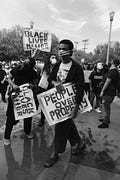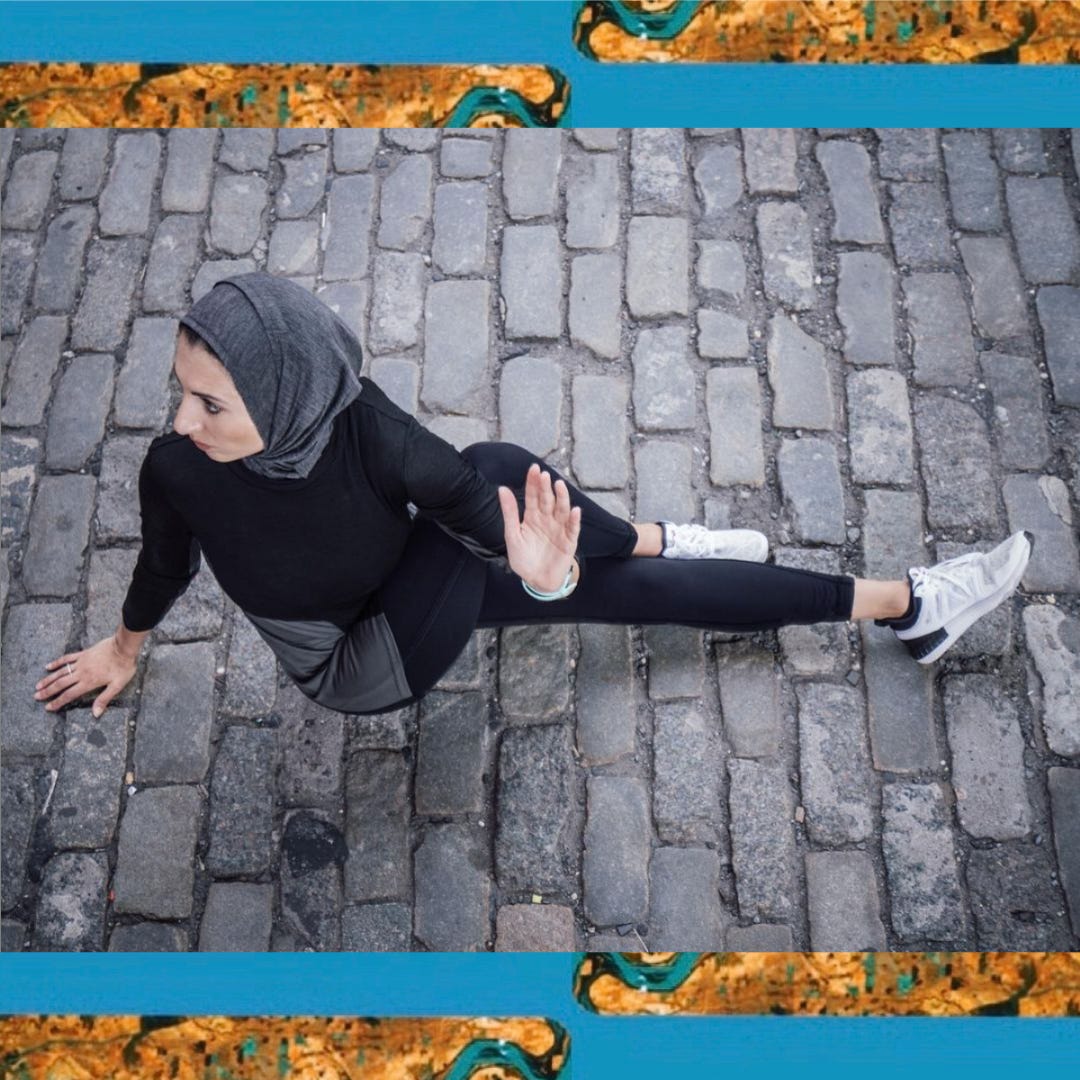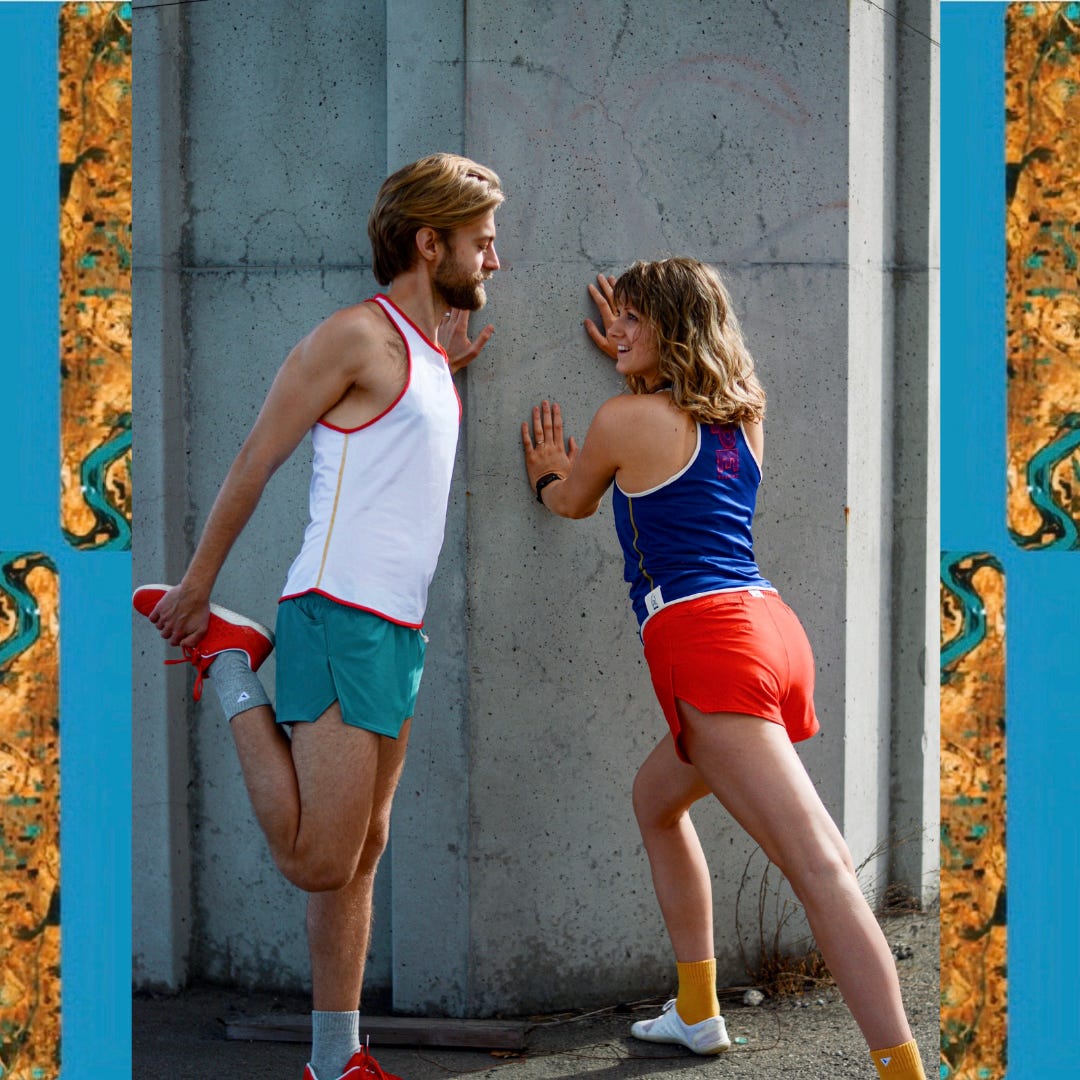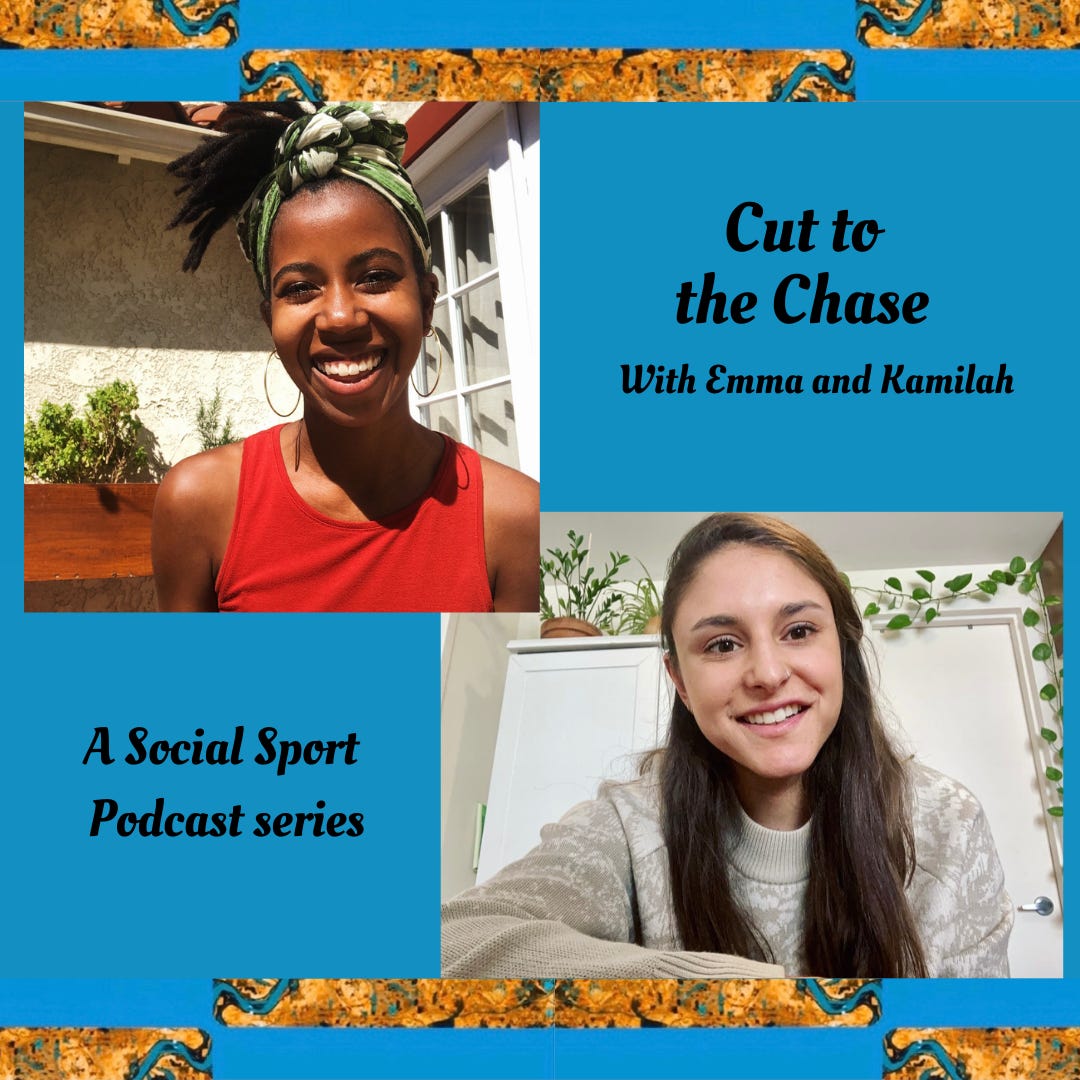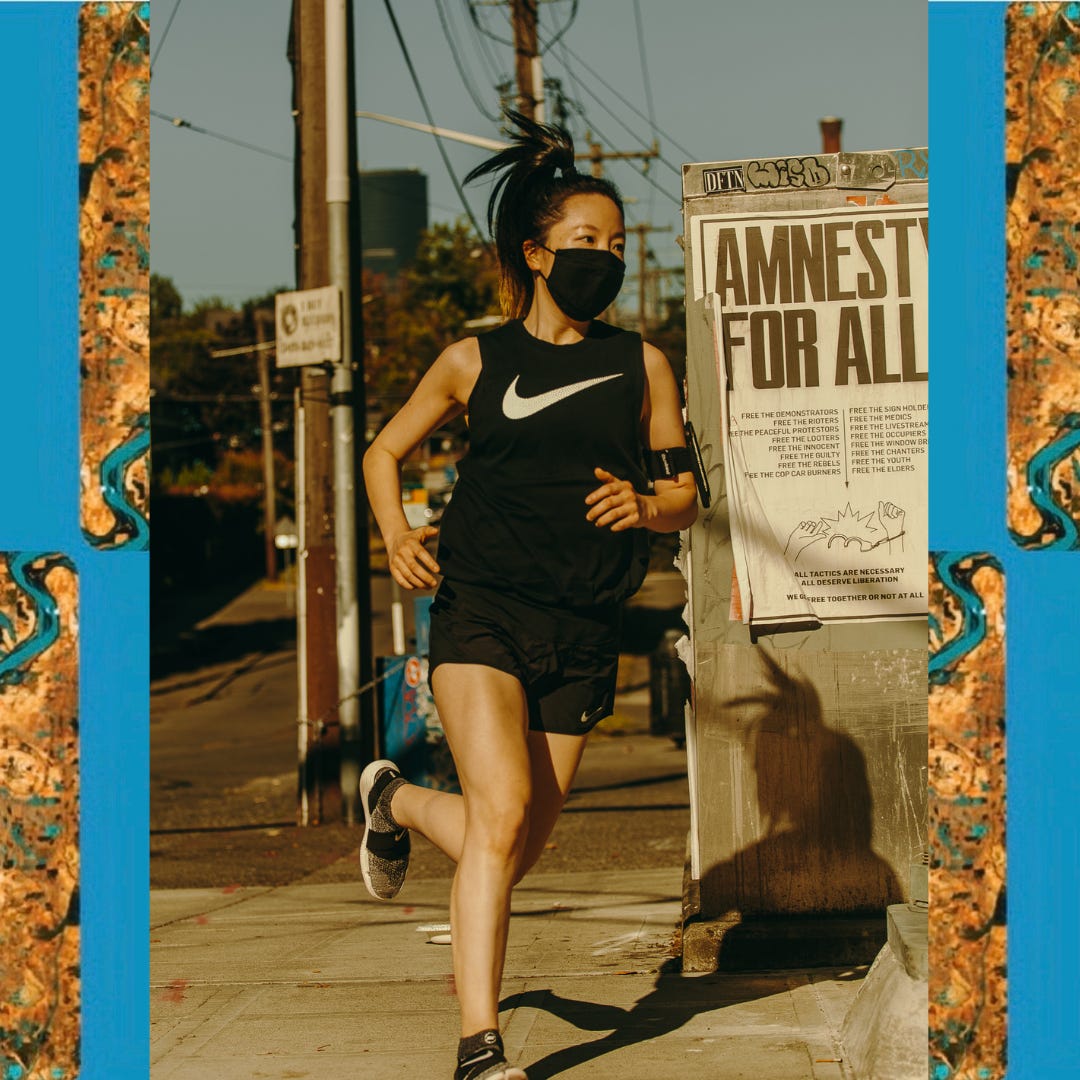No return to normal
Lessons endurance athletes must carry with them into the post-pandemic world
This month, I have no notable stories, no notable events. In fact, there is nothing notable about right now; nothing in the offices opening, the weekend nights where you can sit at bars or in restaurants with friends. In the endurance sports world, there are track meets with spectators, and road races with growing fields. The old normal is eating away at the new normal. Soon, old will swallow new entirely.
Un-notable is welcome. In fact, un-notable is something we haven’t seen since the start of the pandemic, and maybe even since the fall of 2016. So, we will sit in our average restaurants and sip on our average drinks and arrive in our offices to do our average jobs and get angry at things like our trains running late on Wednesday mornings. And all will be so utterly, beautifully, un-notable.
And yet (of course there is an “and yet!”), while my vaccinated self relaxes into the ease of normalcy’s return, I grow afraid, too.
We have heard and read it countless times: COVID-19 made the many injustices in our country more evident. It’s an easy soundbite—easy to insert into news segments or daily conversation, easy to roll around on our tongues and make us feel a certain way: well-read, in-the-know, woke, maybe. But for some of us, more than others, we hardly ever have to engage with the reality of those many injustices.
My fear is that, when the old normal consumes the new normal entirely—when COVID-19 is a chapter in our kids’ history books, or a few masked portraits at the bottom of our Instagram profiles—it will be all too easy to forget about these many injustices. It will be all too easy to forget about the things we once said this pandemic would teach us.
I have been thinking about the ways in which we—endurance athletes—can ensure that we don’t forget the lessons learned from this pandemic time. We must keep reminding ourselves of the injustices the pandemic exposed, and how they affect our community. That way, we can keep fighting them, too. The below list is far from exhaustive.

Lessons the endurance sport community must carry into the post-pandemic world:
There are many barriers to entry in endurance and outdoor sports that specifically impact low-income BIPOC, these include:
Transportation to trails and nature from urban environments
Financial cost of transportation and gear
Time cost: some people work many jobs on top of family responsibilities, etc.
Not seeing yourself represented in that sport
Preventing the worst effects of climate change is up to us, and in order to adequately fight climate change, we must constantly think about those most vulnerable.
At the beginning of the pandemic, with decreased global transportation, carbon emissions also decreased. At the same time, we realized more than ever the value of the outdoors—the only place we could go to feel safe. I don’t think it’s a coincidence that more athletes have been talking about climate change in the past year and a half.
It’s not enough to clean up the trails we run on or decrease our personal carbon footprints, we must center people and justice in our environmentalism.
Safety! Not everyone is made to feel safe while taking part in endurance and outdoor sports. Safety depends on the identities each person holds, and various Social Sport guests have discussed how their identities have interacted with their safety, especially over the past year.
Coffey of Running to Protest talked about the fear that many Black men hold while running during the daytime, during this Social Sport Podcast episode.
Sandy Namgung talks about the fear she carried as a result of increased anti-Asian violence, and how it led her to stop running for two months, in this episode.
According to this Runner’s World survey, 84% of women have faced harassment while running. Latoya Shauntay Snell and Taylor Dutch of the Runners’ Alliance talk about that during this episode.
Psychological safety is also a powerful thing! If you are not welcomed as who you are in a sport community—due to your race, ethnicity, gender, sexuality, etc.—you will count yourself out before you even get to take part in that sport. Indra Hayre talks about psychological safety during this episode.
Podcast episodes of the past month
Rahaf Khatib on communicating her worth as a covered Muslim American woman in running.
“𝗜 𝗮𝗹𝘄𝗮𝘆𝘀 𝘀𝗮𝘆, 𝗶𝗳 𝘆𝗼𝘂 𝗼𝗿𝗴𝗮𝗻𝗶𝘇𝗲 𝘆𝗼𝘂𝗿 𝗹𝗶𝗳𝗲 𝗮𝗿𝗼𝘂𝗻𝗱 𝘆𝗼𝘂𝗿 𝗽𝗮𝘀𝘀𝗶𝗼𝗻, 𝘆𝗼𝘂 𝗰𝗮𝗻 𝘁𝘂𝗿𝗻 𝘆𝗼𝘂𝗿 𝗽𝗮𝘀𝘀𝗶𝗼𝗻 𝗶𝗻𝘁𝗼 𝘆𝗼𝘂𝗿 𝘀𝘁𝗼𝗿𝘆, 𝗮𝗻𝗱 𝘁𝗵𝗲𝗻, 𝘆𝗼𝘂 𝗰𝗮𝗻 𝘁𝘂𝗿𝗻 𝘆𝗼𝘂𝗿 𝘀𝘁𝗼𝗿𝘆 𝗶𝗻𝘁𝗼 𝘀𝗼𝗺𝗲𝘁𝗵𝗶𝗻𝗴 𝗯𝗶𝗴𝗴𝗲𝗿 𝗮𝗻𝗱 𝘀𝗼𝗺𝗲𝘁𝗵𝗶𝗻𝗴 𝘁𝗵𝗮𝘁 𝗺𝗮𝘁𝘁𝗲𝗿𝘀. 𝗧𝗵𝗶𝘀 𝗶𝘀 𝗮 𝗾𝘂𝗼𝘁𝗲 𝘁𝗵𝗮𝘁 𝗜 𝗹𝗶𝘃𝗲 𝗯𝘆, 𝗮𝗻𝗱 𝗺𝘆 𝗽𝗮𝘀𝘀𝗶𝗼𝗻 𝗶𝘀 𝘀𝗵𝗮𝘁𝘁𝗲𝗿𝗶𝗻𝗴 𝘀𝘁𝗲𝗿𝗲𝗼𝘁𝘆𝗽𝗲𝘀 𝗮𝗯𝗼𝘂𝘁 𝘂𝘀, [𝗰𝗼𝘃𝗲𝗿𝗲𝗱 𝗠𝘂𝘀𝗹𝗶𝗺 𝗔𝗺𝗲𝗿𝗶𝗰𝗮𝗻 𝘄𝗼𝗺𝗲𝗻],” -Rahaf Khatib
In this episode, Rahaf, the first hijabi (covered Muslim American woman) to appear on the cover of a fitness magazine, shares the struggles and joys of her work in the running community, and speaks candidly about the burden of unpaid work—a burden that far too many women of marginalized identities are expected to carry.
Savannah and Dallas Erdahl of OPE Running on handmade, sustainable, and ethical running apparel.
“𝗜𝗳 𝘆𝗼𝘂’𝗿𝗲 𝗴𝗲𝘁𝘁𝗶𝗻𝗴 𝗮 𝘁-𝘀𝗵𝗶𝗿𝘁 𝗳𝗼𝗿 𝗳𝗶𝘃𝗲 𝗱𝗼𝗹𝗹𝗮𝗿𝘀, 𝘁𝗵𝗮𝘁 𝗰𝗼𝘀𝘁 𝗶𝘀 𝗰𝗼𝗺𝗶𝗻𝗴 𝗳𝗿𝗼𝗺 𝘀𝗼𝗺𝗲𝘄𝗵𝗲𝗿𝗲. 𝗦𝗼𝗺𝗲𝗼𝗻𝗲 𝗶𝘀 𝗽𝗮𝘆𝗶𝗻𝗴 𝗳𝗼𝗿 𝘁𝗵𝗮𝘁—𝘁𝗵𝗲 𝗲𝗻𝘃𝗶𝗿𝗼𝗻𝗺𝗲𝗻𝘁 𝗶𝘀 𝗽𝗮𝘆𝗶𝗻𝗴 𝗳𝗼𝗿 𝗶𝘁, 𝗼𝗿 𝗽𝗲𝗼𝗽𝗹𝗲 𝗮𝗿𝗲 𝗽𝗮𝘆𝗶𝗻𝗴 𝗳𝗼𝗿 𝗶𝘁 𝘄𝗶𝘁𝗵 𝘁𝗵𝗲𝗶𝗿 𝗹𝗮𝗯𝗼𝗿. 𝗬𝗼𝘂’𝗿𝗲 𝗻𝗼𝘁 𝗺𝗮𝗴𝗶𝗰𝗮𝗹𝗹𝘆 𝗴𝗲𝘁𝘁𝗶𝗻𝗴 𝗮 𝗳𝗶𝘃𝗲 𝗱𝗼𝗹𝗹𝗮𝗿 𝘀𝗵𝗶𝗿𝘁. 𝗦𝗼𝗺𝗲𝗼𝗻𝗲 𝗵𝗮𝘀 𝘁𝗼 𝗱𝗲𝗮𝗹 𝘄𝗶𝘁𝗵 𝘁𝗵𝗲 𝗰𝗼𝗻𝘀𝗲𝗾𝘂𝗲𝗻𝗰𝗲𝘀. 𝗪𝗲 𝘄𝗮𝗻𝘁 𝘁𝗼 𝘀𝗲𝗲 𝗼𝘁𝗵𝗲𝗿 𝗯𝗿𝗮𝗻𝗱𝘀 𝗼𝘄𝗻 𝘂𝗽 𝘁𝗼 𝘁𝗵𝗮𝘁 𝗰𝗼𝘀𝘁.” -Dallas Erdahl
“𝗢𝗻𝗲 𝗼𝗳 𝘁𝗵𝗲 𝗴𝗿𝗲𝗮𝘁𝗲𝘀𝘁 𝗰𝗵𝗮𝗹𝗹𝗲𝗻𝗴𝗲𝘀 𝗳𝗼𝗿 𝗺𝗲 𝘄𝗮𝘀 𝘁𝗼 𝗯𝗲 𝘁𝗮𝗸𝗲𝗻 𝘀𝗲𝗿𝗶𝗼𝘂𝘀𝗹𝘆 𝗶𝗻 𝗮𝗻 𝗶𝗻𝗱𝘂𝘀𝘁𝗿𝘆 𝘁𝗵𝗮𝘁’𝘀 𝗴𝗲𝗻𝗲𝗿𝗮𝗹𝗹𝘆 𝗿𝘂𝗻 𝗯𝘆 𝗼𝗹𝗱𝗲𝗿, 𝗪𝗵𝗶𝘁𝗲 𝗺𝗲𝗻.” -Savannah Erdahl
Savannah and Dallas are the cofounders of Minnesota-based @operunning, a sustainable and ethical running apparel brand. At OPE Running, all apparel is created from recycled or dead stock materials, and HANDMADE by Savannah.
Cut to the Chase with Emma and Kamilah: People Centered Environmentalism.
People-centered environmentalism: What does it mean to us? What does it look like in practice? How can athletes better serve this planet and, most of all, the people who call it home?
Sam Snyder, PhD, on where conservation, political organizing, and running intersect.
“𝗪𝗲 𝗵𝗮𝘃𝗲 𝘁𝗼 𝗯𝗲 𝘄𝗶𝗹𝗹𝗶𝗻𝗴 𝘁𝗼 𝗮𝘀𝗸 𝗾𝘂𝗲𝘀𝘁𝗶𝗼𝗻𝘀 𝗮𝘀 𝗿𝘂𝗻𝗻𝗲𝗿𝘀. 𝗔𝗻𝗱 𝗶𝘁’𝘀 𝗵𝗮𝗿𝗱. 𝗔 𝗹𝗼𝘁 𝗼𝗳 𝗿𝘂𝗻𝗻𝗲𝗿𝘀 𝘀𝗮𝘆, ‘𝗜 𝘄𝗮𝗻𝘁 𝘁𝗼 𝗸𝗲𝗲𝗽 𝗺𝘆 𝗿𝘂𝗻𝗻𝗶𝗻𝗴 𝗽𝗼𝗹𝗶𝘁𝗶𝗰𝘀 𝗳𝗿𝗲𝗲.’ 𝗕𝘂𝘁 𝗜 𝘁𝗵𝗶𝗻𝗸 𝘁𝗵𝗲 𝗽𝗮𝘀𝘁 𝘆𝗲𝗮𝗿, 𝗶𝗻 𝗽𝗮𝗿𝘁𝗶𝗰𝘂𝗹𝗮𝗿, 𝗵𝗮𝘀 𝘀𝗵𝗼𝘄𝗻 𝘂𝘀 𝘁𝗵𝗮𝘁 𝘁𝗼 𝗵𝗮𝘃𝗲 𝗿𝘂𝗻𝗻𝗶𝗻𝗴 𝗯𝗲 𝗽𝗼𝗹𝗶𝘁𝗶𝗰𝘀 𝗳𝗿𝗲𝗲 𝗶𝘀 𝗮 𝗽𝗼𝘀𝗶𝘁𝗶𝗼𝗻 𝗼𝗳 𝗽𝗿𝗶𝘃𝗶𝗹𝗲𝗴𝗲. 𝗜𝘁 𝗱𝗼𝗲𝘀𝗻’𝘁 𝗵𝗮𝘃𝗲 𝘁𝗼 𝗶𝗻𝘂𝗻𝗱𝗮𝘁𝗲 𝗮𝗹𝗹 𝗼𝗳 𝘆𝗼𝘂𝗿 𝗿𝘂𝗻𝗻𝗶𝗻𝗴, 𝗯𝘂𝘁 𝗶𝘁’𝘀 𝘄𝗼𝗿𝘁𝗵 𝗽𝗮𝘂𝘀𝗶𝗻𝗴 𝗲𝘃𝗲𝗿𝘆 𝗻𝗼𝘄 𝗮𝗻𝗱 𝘁𝗵𝗲𝗻 𝗮𝗻𝗱 𝗮𝘀𝗸𝗶𝗻𝗴 𝗮 𝗳𝗲𝘄 𝗾𝘂𝗲𝘀𝘁𝗶𝗼𝗻𝘀 𝗯𝗲𝗳𝗼𝗿𝗲 𝘆𝗼𝘂 𝗰𝗼𝗻𝘁𝗶𝗻𝘂𝗲 𝗼𝗻 𝘆𝗼𝘂𝗿 𝘄𝗮𝘆.” -Sam Snyder, PhD.
Sam is an organizer and communicator with over a decade of experience leading environmental and conservation political campaigns in Alaska, including working with the Wild Salmon Center to protect Alaska’s Bristol Bay from mining. This episode is a great nod to one of our favorite topics: people-centered environmentalism, as all of Sam’s work engages deeply with the tribes on the land, the livelihoods supported by the land, and the history of the land.
Sandy Namgung, on speaking up against anti-Asian violence and not letting racism win.
“𝗜𝗳 𝗜 𝗸𝗲𝗲𝗽 𝗼𝗻 𝗻𝗼𝘁 𝗿𝘂𝗻𝗻𝗶𝗻𝗴 [𝗼𝘂𝘁 𝗼𝗳 𝗳𝗲𝗮𝗿], 𝗶𝗳 𝗜 𝗸𝗲𝗲𝗽 𝗱𝗲𝗻𝘆𝗶𝗻𝗴 𝗺𝘆𝘀𝗲𝗹𝗳 𝘁𝗵𝗶𝘀 𝗵𝗮𝗽𝗽𝗶𝗻𝗲𝘀𝘀, 𝘁𝗵𝗲𝗺 𝗜’𝗺 𝗹𝗲𝘁𝘁𝗶𝗻𝗴 𝗿𝗮𝗰𝗶𝘀𝗺 𝘄𝗶𝗻. 𝗜’𝗺 𝗹𝗲𝘁𝘁𝗶𝗻𝗴 𝗵𝗮𝘁𝗲 𝘄𝗶𝗻. 𝗧𝗵𝗮𝘁 𝘁𝗵𝗼𝘂𝗴𝗵𝘁 𝗶𝘀 𝘄𝗵𝗮𝘁 𝗹𝗲𝗱 𝗺𝗲 𝘁𝗼 𝘀𝘁𝗮𝗿𝘁 𝗿𝘂𝗻𝗻𝗶𝗻𝗴 𝗮𝗴𝗮𝗶𝗻.” -Sandy Namgung.
Through her work, Sandy fights against the harmful casting of Asian Americans as “model minorities,” and contributes to a new narrative that recognizes and values the diversity of Asian people and their full personhood. In this episode, we talk about standing up, speaking out, challenging myths, running and cultural beauty standards, and much more.
Announcements and Actions
In case you forgot that transgender athletes’ rights are human rights…
Runners for Public Lands and the Running Industry Diversity Coalition put out a powerful statement, supporting transgender youth in sports, with information and action items for runners to fight anti-trans legislation.
Sign this form by Athlete Ally to join athletes and coaches in speaking out for transgender athletes to be welcomed in the sport of running.
We cannot, cannot, cannot forget to celebrate big wins: Alabama’s SB10, a bill that would have criminalized the prescription of gender-affirming treatments for transgender youth, died on the final night of the Alabama Legislature's 2021 session.
This SWAP podcast episode was unique and important because it stated firm support for transgender athletes’ rights while coming from a place of love for those who are not on the same page with this issue—a hard but necessary approach to take if we want more people to support transgender athletes’ rights.
Register for Nikki Hiltz’ Pride 5k, in support of the Trevor Project, an organization that provides support for LGBTQ+ youth
Don’t forget to sign up for the Philadelphia Distance Run, the first ever U.S. road race with a nonbinary division all the way up to the elite level. In other words, if you don’t identify as male or female, there is a place for you in this race.
The Washington Post put out an important article about how Olympians who are nursing mothers might have to choose between the games and their babies.
What I’m reading
I just read the Vanishing Half by Brit Bennet, which is a book that I feel like everyone is reading, about race and family relationships. This book was really good, and popular for good reason.
Girlhood by Melissa Febos. This book of essays is about the narratives women are told as girls, often related to their sexualization, and how these narratives shape them. I loved this; I am most impressed by all the THINGS Febos does: she weaves together research with memoir and lyrical language so well. Definitely worth a read.
This poem, by Blas Falconer, “My son wants to know who his biological father is,” slays me.
What I’m obsessed with
This sweet n’ savory roasted nuts and pretzels recipe.
This song, Drinkee by Sophie Tucker.
Thanks for reading, and stay tuned for Monday’s episode of the Social Sport Podcast!
You can subscribe to the Social Sport Podcast, and follow Social Sport on Instagram, Twitter, and Facebook. Feel free to slip into the Social Sport DM’s on Instagram, or send me an email at socialsportpod@gmail.com to let me know what you think of the show or newsletter!
Stay sporty & keep resisting (for real, don’t forget),
Emma

